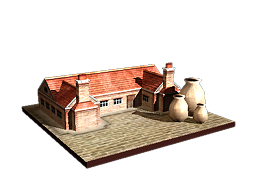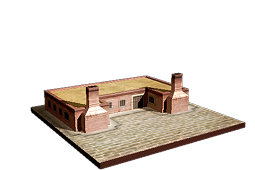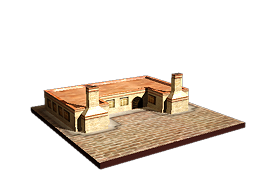Pottery Workshops (ETW building)
| Pottery Workshops | |||||||
|---|---|---|---|---|---|---|---|
| Category: | Pottery Industry | ||||||
| Level: | 1 | ||||||
| Turns to build: | 3 | ||||||
| Building cost: | 2000 | ||||||
| |||||||
| Requires | |||||||
| Craft Workshops (Potters) | |||||||
| Enables | |||||||
| Kilns | |||||||
Pottery workshops are a “cottage industry” enterprise, where each potter carries out all the manufacturing process rather than splitting the work between specialists.
A pottery workshop needs only a supply of clay – something that can be found almost anywhere in the world – and charcoal for the kiln, and the charcoal is optional if unfired “greenware” is being made. Most pottery produced is earthenware. Even with a highly skilled potter, there is a limit to how much can be produced. Pottery is a batch-production process, and the rate of production is limited by the size of the potter’s kiln and the time needed for the kiln to cool safely after firing a batch. That said, if an entire community is engaged in the trade, it is possible to make significant numbers of small batches.
Pottery was one of the earliest types of human manufactured items. The process of making ceramics barely changed in hundreds of years: an 18th Century potter would have had no trouble working in a Roman or Ancient Egyptian pottery works, for example. Many local styles evolved over time, partly thanks to the difficulty of moving (relatively fragile) goods any distance by land.




